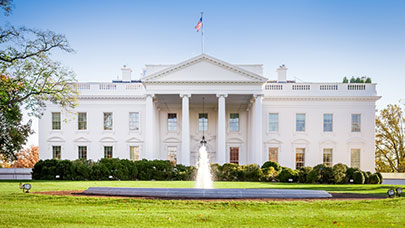Trump Rescinds Biden’s AI Order, Announces $500B Investment in AI Infrastructure
President Donald Trump signed a flurry of executive orders during his first day in office, including one that rescinded his predecessor’s order addressing AI risk. The new president indicated he viewed the old order as unnecessarily stifled an emerging industry. Trump also held a press conference today during which he announced that private companies would invest up to $500 billion in AI infrastructure. In October 2023, Joe Biden signed an executive order that addressed looming concerns around the use of AI and generative AI in particular. Since Congress failed to establish a law outlining the approach that the United States would take, as the European Commission did with the AI Act, Biden acted unilaterally with an executive order. That order had several parts, including requiring the National Institute of Standards and Technology (NIST) to establish standards for “red team safety tests” of AI models and requiring developers of the foundation model to notify the government when training the model and sharing the results of the tests. Biden also ordered the Department of Commerce to develop standards for detecting AI-generated content; required the establishment of a program to use AI to “find and fix” security vulnerabilities; and required the National Security Council and White House Chief of Staff to further research AI and security. Biden’s orders were mostly well-received at the time, particularly among folks who were worried about the influence of AI on business and society and sought to rein it in. However, Trump took the view that his predecessor’s regulations posed an unnecessary burden to AI development, as well as a potential national security concern, should it slow down the pace of AI innovation versus adversaries, such as China. The end of Biden’s AI regulations spurred immediate cries of alarm, with some people suggesting that “dangerous events such as AI suggesting teens to cut themselves or AI aiding life-threatening explosive attacks are about to become a lot more common,” one source told BigDATAwire. It also could lead to new legal issues for AI companies. “The move to revoke Biden’s executive order has led to a climate of regulatory uncertainty for companies operating in AI-driven fields,” writes Aaron K. Tantleff, a partner with the law firm Foley & Lardner LLP. “In the absence of a unified federal framework, businesses could encounter various challenges, such as an inconsistent regulatory landscape as states and international organizations intervene, increased risks related to AI ethics and data privacy, and unfair competition among companies that implement differing standards for AI development and deployment.” In other news, Trump announced up to $500 billion in private sector investment in AI infrastructure. OpenAI, Softbank, and Oracle have agreed to participate in a joint venture called Stargate that will invest in data centers to power AI. Oracle founder Larry Ellison said at a press conference today that 10 Stargate data centers are already under construction in Texas and more are planned. This article first appeared on sister site BigDATAwire.

President Donald Trump signed a flurry of executive orders during his first day in office, including one that rescinded his predecessor’s order addressing AI risk. The new president indicated he viewed the old order as unnecessarily stifled an emerging industry. Trump also held a press conference today during which he announced that private companies would invest up to $500 billion in AI infrastructure.
In October 2023, Joe Biden signed an executive order that addressed looming concerns around the use of AI and generative AI in particular. Since Congress failed to establish a law outlining the approach that the United States would take, as the European Commission did with the AI Act, Biden acted unilaterally with an executive order.
That order had several parts, including requiring the National Institute of Standards and Technology (NIST) to establish standards for “red team safety tests” of AI models and requiring developers of the foundation model to notify the government when training the model and sharing the results of the tests. Biden also ordered the Department of Commerce to develop standards for detecting AI-generated content; required the establishment of a program to use AI to “find and fix” security vulnerabilities; and required the National Security Council and White House Chief of Staff to further research AI and security.
 Biden’s orders were mostly well-received at the time, particularly among folks who were worried about the influence of AI on business and society and sought to rein it in. However, Trump took the view that his predecessor’s regulations posed an unnecessary burden to AI development, as well as a potential national security concern, should it slow down the pace of AI innovation versus adversaries, such as China.
Biden’s orders were mostly well-received at the time, particularly among folks who were worried about the influence of AI on business and society and sought to rein it in. However, Trump took the view that his predecessor’s regulations posed an unnecessary burden to AI development, as well as a potential national security concern, should it slow down the pace of AI innovation versus adversaries, such as China.
The end of Biden’s AI regulations spurred immediate cries of alarm, with some people suggesting that “dangerous events such as AI suggesting teens to cut themselves or AI aiding life-threatening explosive attacks are about to become a lot more common,” one source told BigDATAwire. It also could lead to new legal issues for AI companies.
“The move to revoke Biden’s executive order has led to a climate of regulatory uncertainty for companies operating in AI-driven fields,” writes Aaron K. Tantleff, a partner with the law firm Foley & Lardner LLP. “In the absence of a unified federal framework, businesses could encounter various challenges, such as an inconsistent regulatory landscape as states and international organizations intervene, increased risks related to AI ethics and data privacy, and unfair competition among companies that implement differing standards for AI development and deployment.”
In other news, Trump announced up to $500 billion in private sector investment in AI infrastructure. OpenAI, Softbank, and Oracle have agreed to participate in a joint venture called Stargate that will invest in data centers to power AI. Oracle founder Larry Ellison said at a press conference today that 10 Stargate data centers are already under construction in Texas and more are planned.
This article first appeared on sister site BigDATAwire.
What's Your Reaction?




























